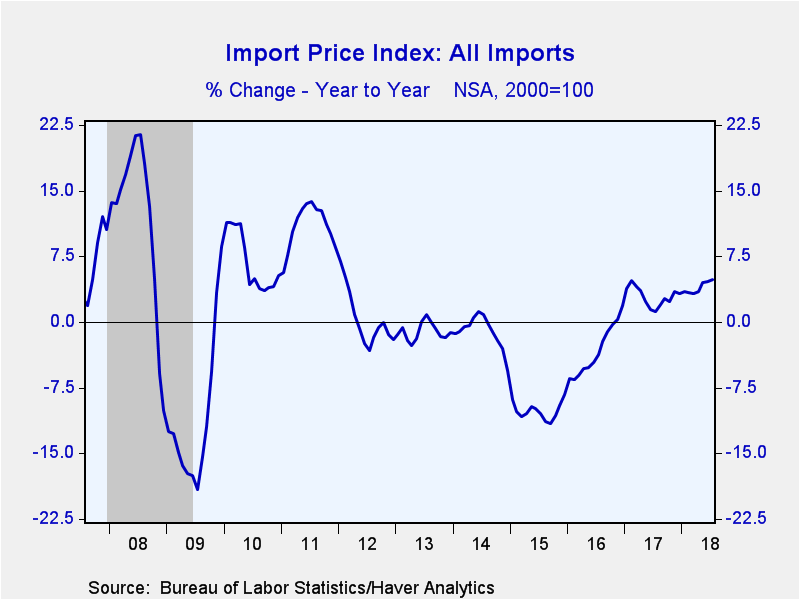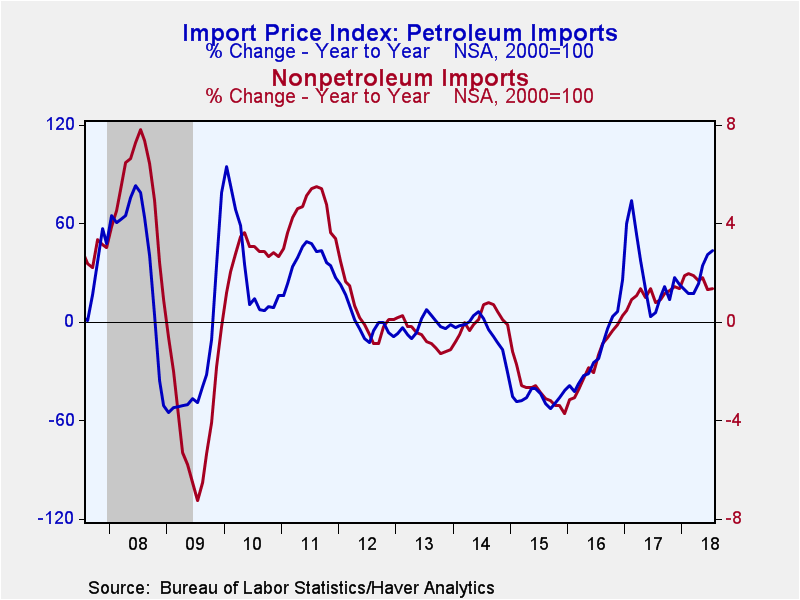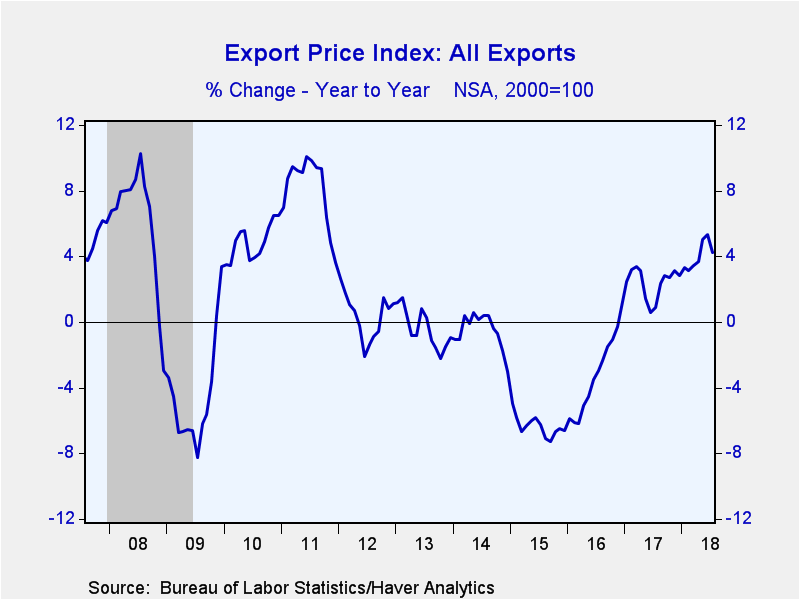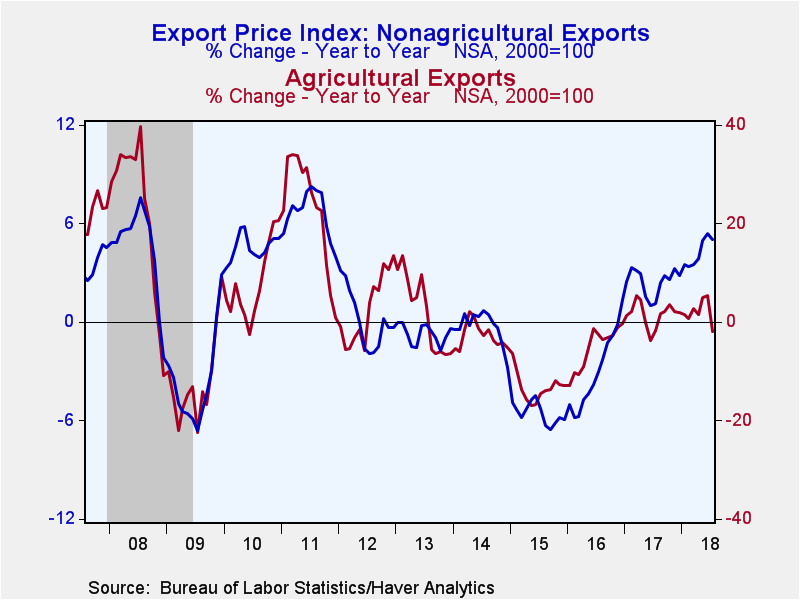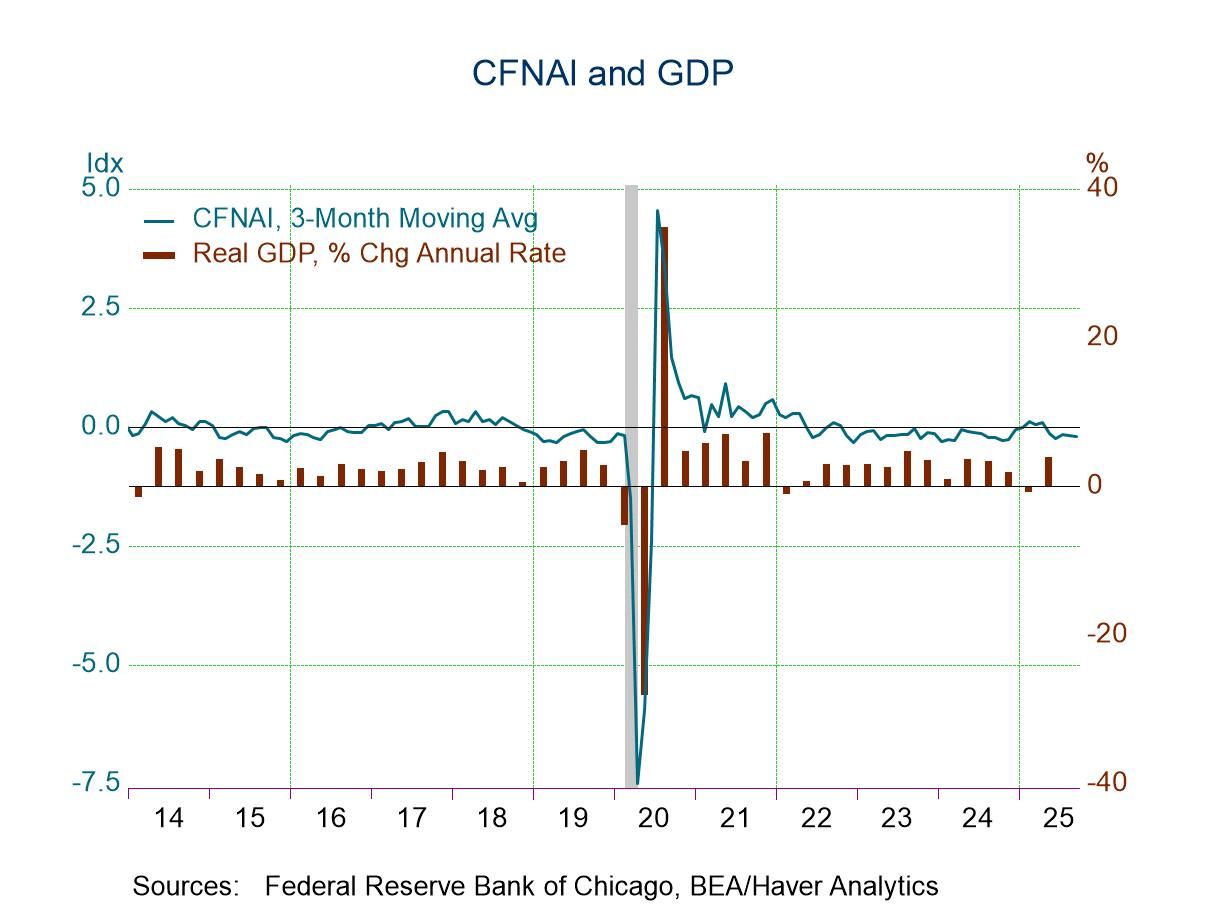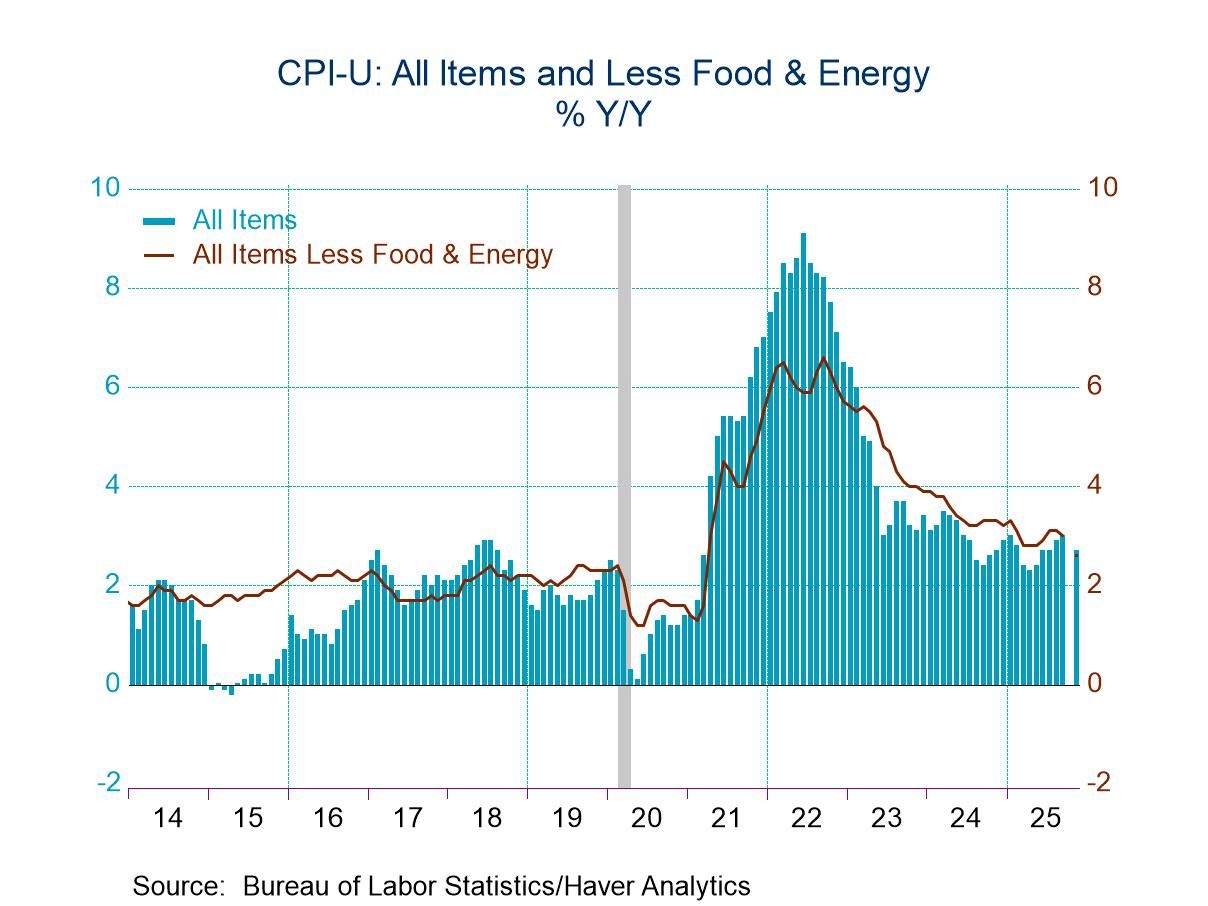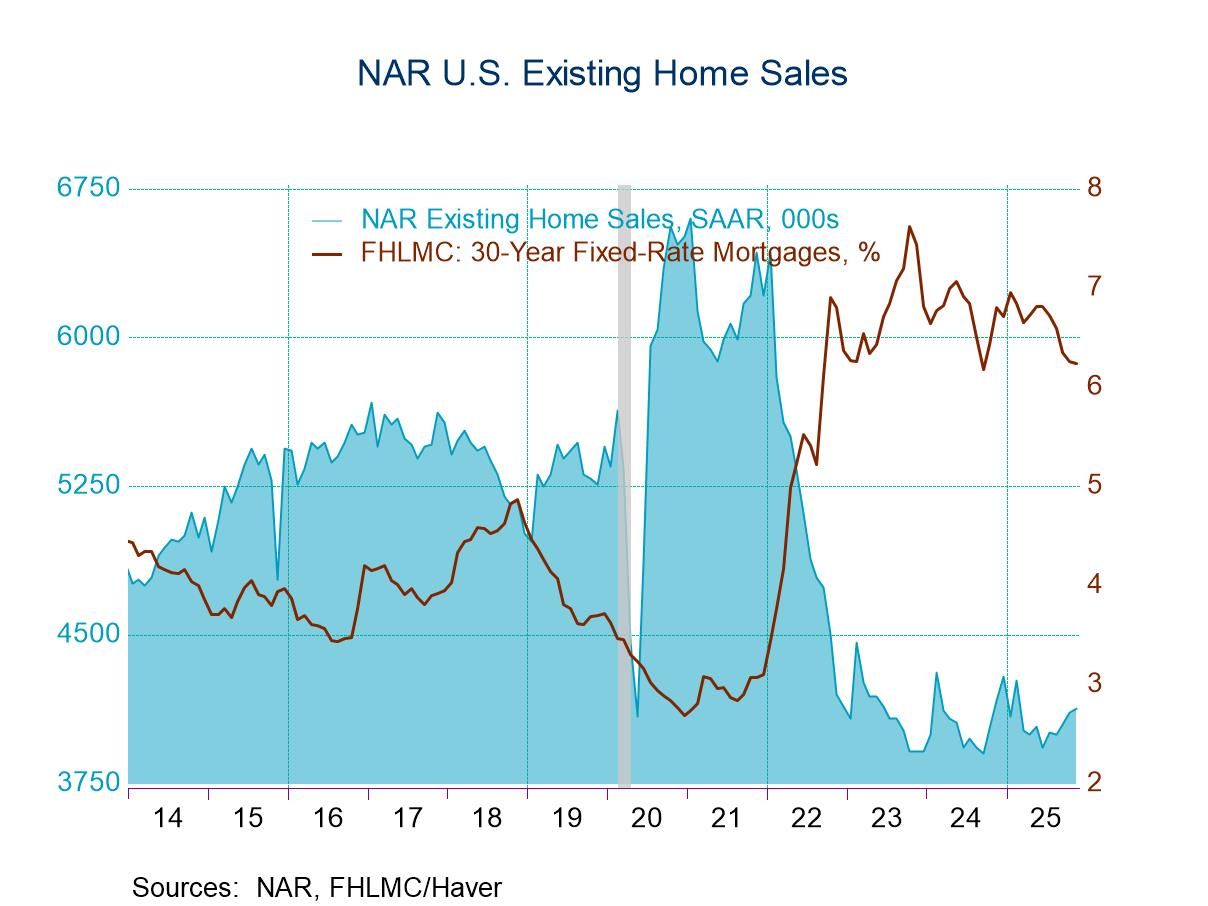 Global| Aug 14 2018
Global| Aug 14 2018U.S. Import Prices Hold Steady; Export Prices Weaken
by:Tom Moeller
|in:Economy in Brief
Summary
Import prices remained unchanged during July (4.8% y/y) following a 0.1% slip in June, which was revised from -0.4%. A 0.1% uptick had been expected in the Action Economics Forecast Survey. These figures are not seasonally adjusted. [...]
Import prices remained unchanged during July (4.8% y/y) following a 0.1% slip in June, which was revised from -0.4%. A 0.1% uptick had been expected in the Action Economics Forecast Survey. These figures are not seasonally adjusted.
Weakness in import prices last month was led by a 0.1% slip (+1.3% y/y) in nonpetroleum import costs which followed a 0.4% drop. The decline was paced by a 1.8% shortfall (-3.8% y/y) in prices of foods, feeds and beverages which followed a 2.6% decline during June. Capital goods prices eased 0.1% (+0.3% y/y) for the third straight month. Prices of computers, peripherals & semiconductors held steady both m/m and y/y. Capital goods prices excluding computers, semiconductors & peripherals were unchanged (+0.4% y/y) after a 0.2% decline. Motor vehicle & parts prices held steady (+0.3% y/y) after slipping 0.1% in each of the prior two months. Working 0.3% higher (0.6% y/y) were prices of consumer goods excluding automobiles after falling 0.3%. Industrial supplies and materials prices increased 0.2% (20.9% y/y), but prices excluding petroleum decreased 0.3% (+8.2% y/y) following a 0.2% gain. Petroleum & petroleum product prices jumped 0.9% (43.6% y/y) following two months of even stronger increase.
Export prices declined 0.5% (+4.3% y/y) in July following a 0.2% rise, revised from 0.3%. A 0.2% increase had been expected.
Agricultural export prices weakened 5.3% (-2.0% y/y) following a 1.0% decline. Nonagricultural export prices held steady (5.0% y/y) after a 0.4% gain. Among the end-use categories, prices of industrial supplies and materials fell 0.4% (+12.0% y/y), as petroleum prices held steady (30.1% y/y). Nonagricultural supplies and materials prices excluding fuels and building materials declined 0.4% (+7.0% y/y) following a 0.3% rise. Prices of foods, feeds and beverages were off 4.7% (-2.2% y/y) and added to the prior month's 1.0% decline. Capital good prices held steady (1.8% y/y) following two months of 0.1% gain as computers, peripherals & semiconductors prices rose 0.2% (1.3% y/y) after falling 0.4%. Excluding this sector, capital goods prices were unchanged (1.9% y/y) after a 0.2% rise. Prices of motor vehicles and parts eased 0.1% (+0.8% y/y) for the second straight month. Prices of consumer goods excluding automobiles held steady (+0.8% y/y) after a 0.1% dip in the prior month.
The import and export price series can be found in Haver's USECON database. Detailed figures are available in the USINT database. The expectations figure from the Action Economics Forecast Survey is in the AS1REPNA database.
Do Import Tariffs Help Reduce Trade Deficits? from the Federal Reserve Bank of New York is available here.
| Import/Export Prices (NSA, %) | Jul | Jun | May | Y/Y | 2017 | 2016 | 2015 |
|---|---|---|---|---|---|---|---|
| Imports - All Commodities | 0.0 | -0.1 | 0.9 | 4.8 | 2.9 | -3.3 | -10.2 |
| Petroleum & Petroleum Products | 0.9 | 1.4 | 7.8 | 43.6 | 26.6 | -19.7 | -46.0 |
| Nonpetroleum | -0.1 | -0.4 | 0.1 | 1.3 | 1.1 | -1.5 | -2.8 |
| Exports - All Commodities | -0.5 | 0.2 | 0.7 | 4.3 | 2.4 | -3.2 | -6.3 |
| Agricultural | -5.3 | -1.0 | 1.6 | -2.0 | 1.5 | -5.4 | -13.3 |
| Nonagricultural | 0.0 | 0.4 | 0.6 | 5.0 | 2.5 | -3.0 | -5.5 |
Tom Moeller
AuthorMore in Author Profile »Prior to joining Haver Analytics in 2000, Mr. Moeller worked as the Economist at Chancellor Capital Management from 1985 to 1999. There, he developed comprehensive economic forecasts and interpreted economic data for equity and fixed income portfolio managers. Also at Chancellor, Mr. Moeller worked as an equity analyst and was responsible for researching and rating companies in the economically sensitive automobile and housing industries for investment in Chancellor’s equity portfolio. Prior to joining Chancellor, Mr. Moeller was an Economist at Citibank from 1979 to 1984. He also analyzed pricing behavior in the metals industry for the Council on Wage and Price Stability in Washington, D.C. In 1999, Mr. Moeller received the award for most accurate forecast from the Forecasters' Club of New York. From 1990 to 1992 he was President of the New York Association for Business Economists. Mr. Moeller earned an M.B.A. in Finance from Fordham University, where he graduated in 1987. He holds a Bachelor of Arts in Economics from George Washington University.


